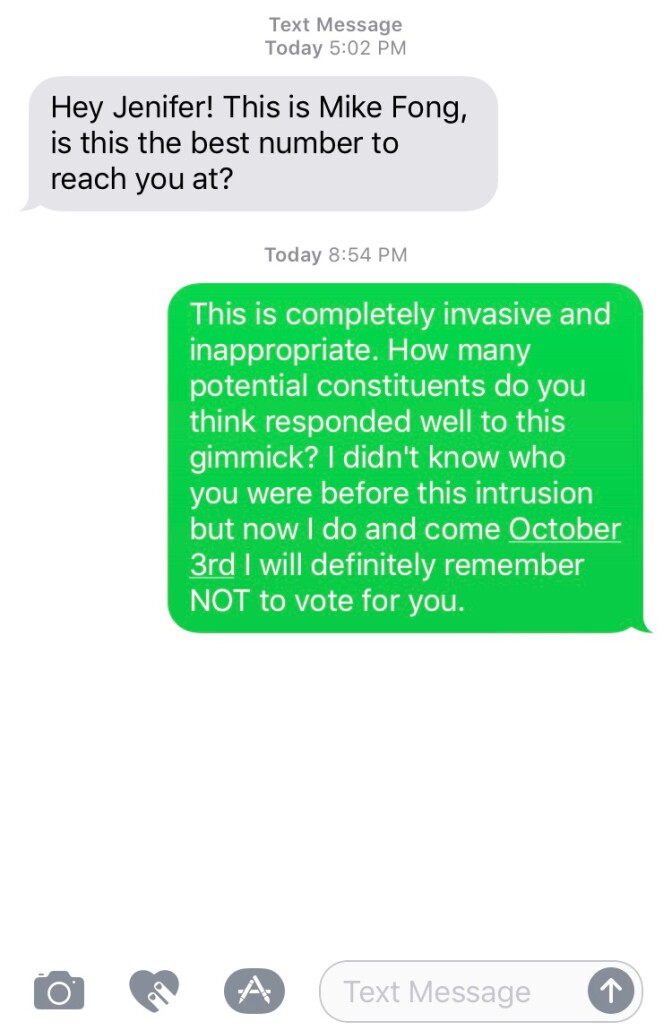This story is free to read because readers choose to support LAist. If you find value in independent local reporting, make a donation to power our newsroom today.
This archival content was originally written for and published on KPCC.org. Keep in mind that links and images may no longer work — and references may be outdated.
California candidate's phone texts creeping out some voters
With 13 people running in the special election in the race for Assembly District 51, candidates have been scrambling to gain the attention of voters. But at least one candidate's texts to voters have been turning off some.
Voter Emily Michaels recently received one of those texts from candidate Mike Fong. As she remembers it, it read: "Hi, Emily, this is Mike Fong. Is this the best number to reach you?"
Michaels' first reaction to the message was, "Who is this?" She racked her brain, thinking it might be a work colleague or an old acquaintance.
"It kind of came off as like a little weird and creepy to me because it just seemed so personal," said Michaels, a resident of Highland Park in Los Angeles.
After a quick Google search, Michaels discovered Fong is one of the candidates competing for the state Assembly seat in a special election scheduled on Oct. 3. The seat opened up when former Assemblyman Jimmy Gomez won election to Congress.
Texting voters as a campaign strategy isn’t totally new. It's been a campaign tactic in California since at least last year. Nationally, texts gained popularity during Bernie Sanders' presidential bid.
Michaels said she’s had other candidates text her before, but never anything this intimate.
Fong declined KPCC's interview requests, and his campaign wouldn’t say how many voters have received texts, but KPCC heard from multiple voters in the 51st district contacted by the candidate.
Fong's campaign manager said the texts go out through a mass texting application called Hustle and the campaign is aware that the messages can sometimes be annoying.
"Anyone who has worked in campaigns or been close to one knows that sometimes people don’t want to be disturbed," said Fong's campaign manager Jose Ugarte, in an emailed statement.
When people ask not to be contacted, the campaign refrains from reaching out to them again, he said.
"We are not just trying to be polite. It is counterproductive for a campaign to bother people — we want people to have positive experiences engaging with our campaign. The last thing we want to do is alienate a voter," Ugarte stated.
Fong’s campaign estimates fewer than 1 percent of voters asked it to stop texting. Ugarte said roughly 15 percent to 20 percent of people who received texts respond positively. The vast majority didn't reply at all.

The special election will be the fifth election of the year for voters in the 51st Assembly district that includes communities like Chinatown and Lincoln Heights.
Voter Jeni Wamburg said while she cares about voting, it’s all just a little too much.
"We’re getting mailers in the mail, people knocking on the door, there’s signs all over the neighborhood," she said.
When she received one of the Fong texts, she said she felt duped. "I happened to be napping so it buzzed and woke me up," she said.
"And I know it’s a crowded race ... but honestly it felt disingenuous," Wamburg said. "When it’s unsolicited, it just feels gross."
One expert contacted by KPCC says the legality of these type of texts often falls in a gray area.
"It's illegal in the U.S. to mass text somebody unsolicited and it's also something that people usually have a very negative response to as well," said Paul Mitchell, vice president of Political Data Inc.
Mitchell says programs designed to send texts in large volumes try to skirt the issue, sending out texts individually.
In an update on the 51st Assembly seat race, Los Angeles County Registrar Dean Logan, whose office is running the special election, sent out a tweet Friday noting that 86,784 mail ballots had been issued. Some 4,432 residents had voted and returned their ballots as of Thursday.
A candidate needs 50 percent plus one vote in the election to win the race outright, otherwise a runoff election will be scheduled.










